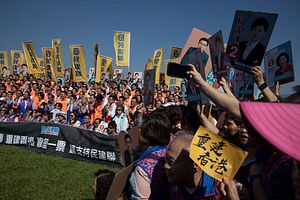Amid fierce protests that have lasted for more than five months, Hong Kong is scheduled to hold district-level elections on November 24. Many expect a decisive win by the pro-democrats at the District Council as the popularity of both Chief Executive Carrie Lam and the once-proud police is at historic lows in polling. Others fear that the election might be called off entirely due to the spiraling violence.
Despite these rumors, it seems that Hong Kong authorities want to go forward with an election that seems inhospitable to its pro-government allies. Why? Because there’s a chance the elections won’t be as disastrous as expected for the establishment.
There are three possible reasons for this:
1. The apt use of subtle forms of electoral manipulation could fool and distract voters.
While electoral malpractices like ballot stuffing and carousel voting are largely absent in Hong Kong, the pro-Beijing loyalists strive to tilt the playing field in more covert manner.
One way is to mask their partisan affiliation and running as independents. Local news revealed that no fewer than 49 candidates in the western part of New Territories have shed their partisan identities in an effort to insulate themselves from the government’s flaws. A similar pattern also plays out in Kowloon East, where dozens of Positive Synergy members are contesting the race without their party labels. Most of these hold conjoint membership with the two largest pro-Beijing parties in Hong Kong politics, namely the Democratic Alliance for the Betterment and Progress of Hong Kong (DAB) and the Hong Kong Federation of Trade Unions (FTU).
This tactic proved very promising in the 2015 election. More than 70 percent of pro-government independents won seats, performing better than any other group across the diverse political spectrum.
Stuffing more candidates onto the ballots is another strategy. Youth members of Beijing-friendly organizations are allegedly being deployed to the constituencies in all 18 district councils, according to a crowdsourcing website on the local election. Instead of limiting the choices available to voters, their active presence at the district would inevitability confuse voters. Past elections have revealed that pro-government candidates tend to win with a plurality rather than an absolute majority; splitting the vote works to their advantage.
2. Pro-government allies can secure votes through patronage.
In addition to an array of tools that can be utilized to leverage the game in favor of the establishment, the clientelistic regime of the pro-government allies can play a significant role in securing their core support.
Backed by the Liaison Office, most Beijing loyalists are more better resourced than their democratic opponents and use that advantage to woo supporters with a variety of giveaways and sponsored activities, known as “snake soups, vegetarian banquets, festival cakes, and dumplings” (she zhai bing zong).
Research has shown that at district council elections voters value the provision of constituent services and benefits and deemphasize the candidates’ political stance. In other words, securing the relationship vote may be more than enough to offset the surge in protest vote.
3. The protest vote could be hamstrung by the fragmented nature of the city’s opposition.
Finally, a strong protest vote does not necessarily turn into electoral gains, as the latter hinges upon the degree of opposition cohesion. The biggest increases in support for non-establishment candidates came from voters aged between 18 and 35, a cohort that is less likely to be lured by goodies. However, these votes are also distancing themselves from the traditional pan-democrat camp. Instead, they are inclined to vote for fresh faces, who often parachuted into the localities just a couple of weeks before the election. While such candidates did have a sizable influence in the last local election, the votes they garnered failed to earn them a significant number of seats in single-member districts (SMD), as attested by the performance of the “post-Umbrella generation” in 2015.
Worse still, the internal rife is so intense that “smart voting” — a strategy that calls for concentrating all protest votes on one opposition candidate in order to maximize electoral gains — is unlikely to function well. An informal lobbying body called Power for Democracy was forged to coordinate various aspiring district councilors within the opposition, but even so nearly 40 constituencies have two or more oppositionist candidates.
Conclusion
The city’s local election, if it goes ahead as scheduled, will serve a major test for both the machine politics of the pro-Beijing bloc and the cohesiveness of the anti-government side.
The upside for the opposition would loom large if they successfully capitalize on newfound support. Conversely, strong clientelism may make the pro-government parties less vulnerable to the protest vote and even prevent them from suffering heavy defeats like they experienced in 2003. If the latter scenario takes place, the Hong Kong authorities may receive a boost for its waning legitimacy.
Steven Yet is a PhD student in political science at the University of Toronto.

































